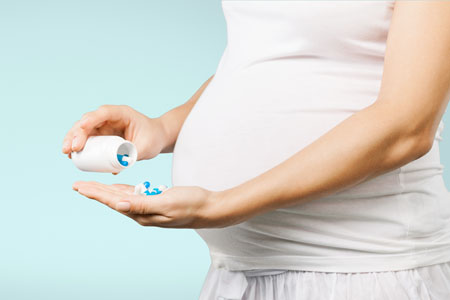Several Studies Find Lamotrigine is Safe in Pregnancy
 Several studies have now suggested that lamotrigine is safe to use during pregnancy. In June 2017, researcher Gali Pariente and colleagues published a systematic review and meta-analysis in the journal CNS Drugs in which they reported that across 21 studies, lamotrigine use during pregnancy was not linked to an increase in birth defects.
Several studies have now suggested that lamotrigine is safe to use during pregnancy. In June 2017, researcher Gali Pariente and colleagues published a systematic review and meta-analysis in the journal CNS Drugs in which they reported that across 21 studies, lamotrigine use during pregnancy was not linked to an increase in birth defects.
In November 2017, a small study from an Israeli medical center reported data from 83 women who received lamotrigine during their first trimester of pregnancy. The study by Merav Cohen-Israel and colleagues in the British Journal of Clinical Pharmacology found that lamotrigine use was not linked to congenital malformations, neurodevelopmental disorders, or withdrawal symptoms in the offspring.
Of the 83 women, 76 received lamotrigine alone, four received it in combination with clonazepam, two with carbamazepine, and one in combination with both levetiracetam and phenytoin.
Antipsychotic Use During Pregnancy Most Likely Safe
A new study suggests that women can continue using antipsychotic medications during the first trimester of pregnancy without meaningfully increasing the risk of birth defects in their offspring.
The study, by Krista F. Huybrechts and colleagues in the journal JAMA Psychiatry, looked at Medicaid users who filled at least one prescription for an antipsychotic medication during their first trimester of pregnancy, when an embryo’s vital organs are formed, and went on to have a live birth. Birth defects, including cardiac malformations, in these children were identified in the first 90 days after delivery and compared to the number of such abnormalities in the children of women on Medicaid who did not receive a prescription for an antipsychotic drug during the first trimester of pregnancy. The number of abnormalities was slightly higher in the children of women who had received atypical antipsychotics than in those who had not, and slightly lower in the children of women who had received a typical antipsychotic than in those who had not.
Huybrechts and colleagues concluded that taking an antipsychotic medication during the first trimester of pregnancy does not meaningfully increase the risk of birth defects in the offspring.
The children of women who took the antipsychotic risperidone did have a small increased risk of birth defects, including cardiac malformations. The researchers called for additional study of risperidone use during pregnancy.
Most SSRIs Free of Birth Defect Risk Early in Pregnancy, Fluoxetine and Paroxetine are Exceptions
A large study of women who took selective serotonin reuptake inhibitor (SSRI) antidepressants in the month before pregnancy and throughout the first trimester suggests that there is a smaller risk of birth defects associated with SSRI use than previously thought, though some risks were elevated in women who took paroxetine or fluoxetine.
The 2015 study, by Jennita Reefhuis and colleagues in the journal BMJ, investigated the drugs citalopram, escitalopram, fluoxetine, paroxetine, and sertraline, and examined birth defects that had previously been associated with SSRI use in smaller studies. The participants were 17,952 mothers of infants with birth defects and 9,857 mothers of infants without birth defects who had delivered between 1997 and 2009.
Sertraline was the most commonly used SSRI among the women in the study. None of the birth defects included in the study were associated with sertraline use early in pregnancy. The study found that some birth defects were 2 to 3.5 times more likely to occur in women who had taken fluoxetine or paroxetine early in their pregnancies.
Five different birth defects, while uncommon, were statistically linked to paroxetine use: anencephaly (undersized brain), heart problems including atrial septal defects and right ventricular outflow tract obstruction defects, and defects in the abdominal wall including gastroschisis and omphalocele. Two types of birth defects were associated with fluoxetine use: right ventricular outflow tract obstruction defects and craniosynostosis (premature fusion of the skull bones). Absolute incidence of these defects was also low.
Valnoctamide Effective in Mania, Maybe Without Valproate’s Side Effects
 Valproate (Depakote), also known as divalproex sodium and valproic acid (VPA), is highly effective in the treatment of mania, seizures, and migraine. However, its use in pregnant mothers can cause birth defects and developmental delay. A closely related compound, valnoctamide, may not pose the same dangers, but its efficacy in mania has only recently been investigated.
Valproate (Depakote), also known as divalproex sodium and valproic acid (VPA), is highly effective in the treatment of mania, seizures, and migraine. However, its use in pregnant mothers can cause birth defects and developmental delay. A closely related compound, valnoctamide, may not pose the same dangers, but its efficacy in mania has only recently been investigated.
Yuly Bersudsky et al. reported at the 4th Biennial Conference of the International Society for Bipolar Disorders conference in Sao Paulo, Brazil in March that valnoctamide was more effective than placebo as an add-on to risperidone for the treatment of mania.
Since there is now evidence that valnoctamide does work in mania, it is plausible that some of the shared characteristics of valproate and valnoctamide, such as increasing brain GABA and blocking sodium channels, are responsible for both drugs’ antimanic effects. Read more



